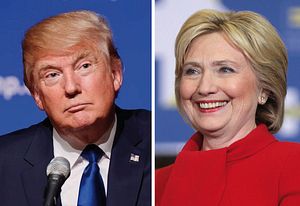The presidential election in the United States is being closely followed in South Asia, as elsewhere. Whether Hillary Clinton or Donald Trump triumphs is an important, game-changing issue for many countries of the world, such as Russia or Japan.
However, in South Asia, it matters a lot less which of the two ends up winning in November. In India’s case, for example, both candidates favor closer ties with New Delhi and relations are likely to continue on an upward trajectory regardless of who wins in the United States.
Pakistan, too, will not find it to be not all too different if Trump or Clinton wins. But this is not because both candidates are well disposed toward it. On the contrary, both Clinton and Trump have expressed skepticism over Pakistan’s foreign policy and counter-terrorism strategy over the past few years and are likely to take a harder line toward the country.
In keeping with his persona of acting tougher and making better deals, Donald Trump has frequently suggested that he would be harder on Pakistan. At a town hall last week, Trump indicated that because Pakistan had nuclear weapons and was “semi-unstable,” he might continue giving that country money although that would go “against [his] grain.” However, Trump also implied that such aid would be temporary and that he would try to find a longer-term solution: “We’re going to look into it,” he said.
“If you look at India and some of the others, maybe they’ll be helping us out,” Trump added, without elaboration. Though not explained well, this could fit with Trump’s worldview of allowing regional powers, such as India, to deal with local problems, rather than the United States always taking the lead.
On May 1, Trump upped that ante against Pakistan during an interview with Fox News last Friday, suggesting that he would stay in Afghanistan to keep an eye on Pakistan and by saying that he would use the full weight of the presidency, if elected, to free Shakeel Afridi, a Pakistani doctor under arrest for assisting the CIA in tracking down Osama bin Laden. Afridi is being held under vague charges and there have been many proposals to arrange for his release by U.S. agencies and politicians. Trump boasted: “I think I would get him out in two minutes. I would tell them, ‘let him out,’ and I’m sure they would let him out.”
The Pakistani government quickly hit back. On Monday, Interior Minister Chaudry Nisar Ali Khan called Trump “ignorant,” argued that only the Pakistani government would decide Afridi’s fate, and declared that “Pakistan is not a colony of the United States of America.”
More, surprising, however, were Hillary Clinton’s recent harsh words directed at Pakistan. Clinton, unlike Trump, favors maintaining and reinforcing existing relationships with U.S. partners and allies. Even when critical, she has seemed less likely to share President Barack Obama’s worries about free-riders or the value of relationships with countries like Saudi Arabia.
Perhaps, however, Clinton was expressing a common bipartisan exasperation with Pakistan when she said that she knew that senior Pakistani leadership knew that Osama bin Laden was hiding in a compound at Abbottabad in 2011, when the United States killed him in a raid there.
In an interview with CNN on Monday, Clinton said that “It was just too much of a coincidence that that house, that unusual-looking house would be built in that community near the military academy, surrounded by retired military professionals, even though, we couldn’t prove [that Pakistani officials knew].’’
If elected president, Clinton would probably take a harder look at Pakistan and cooperation with that country, especially in light of concerns that Pakistan still has links to terrorist groups.
Come what may, U.S.-Pakistani relations will definitely become chillier under the next American president, as he or she reevaluates ties in light of constant obfuscation and disappointing results.

































